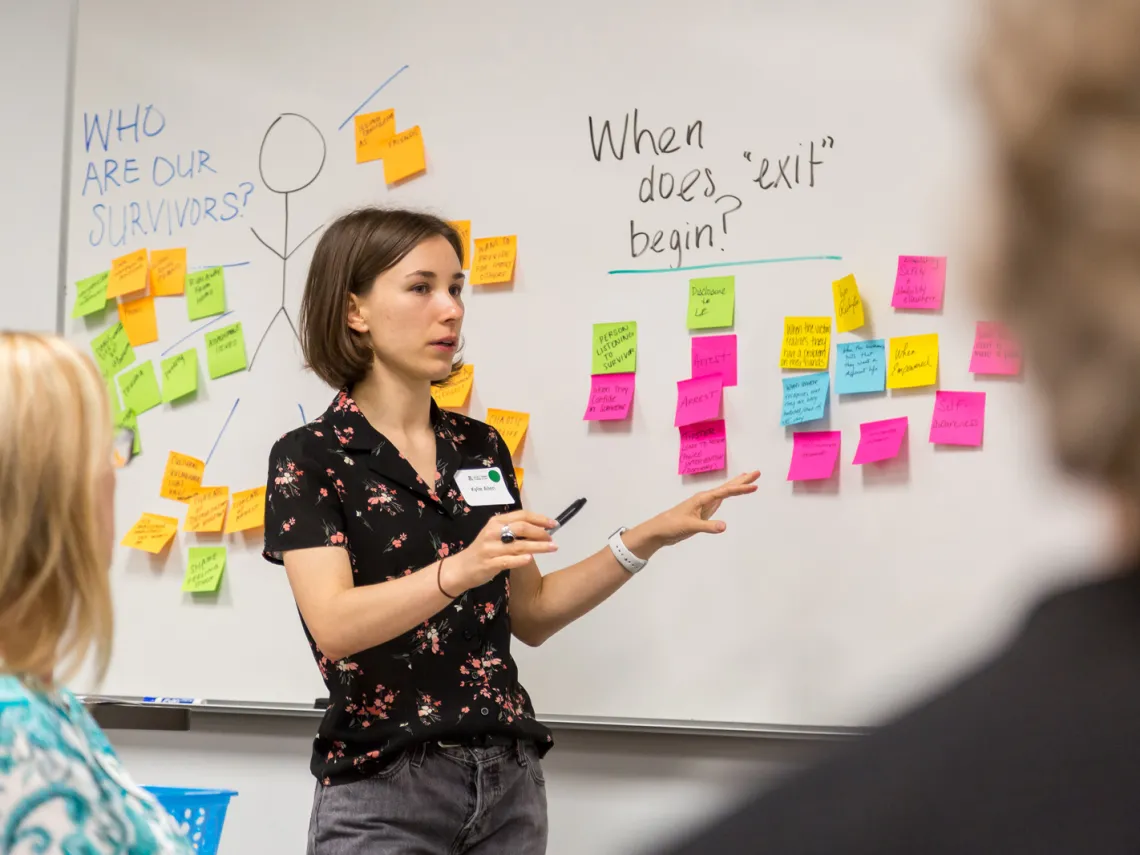New “Licensed Legal Advocates” Program Aims to Close Justice Gap for Domestic Violence Survivors, Provide New Path for Legal Support

Survivors of domestic violence in Arizona will have a new resource to support them in civil legal matters, thanks to a unique pilot program created by the Innovation for Justice Program at the University of Arizona James E. Rogers College of Law, in partnership with the Arizona Supreme Court and Emerge! Center Against Domestic Abuse.
From fall 2020 to fall 2021, the pilot program will evaluate civil legal assistance provided by Licensed Legal Advocates. Licensed Legal Advocates are a new tier of legal professionals who are not licensed attorneys but who will be equipped to provide legal advice to domestic violence survivors with respect to critical domestic-violence-related legal issues, such as the need for a protective order, divorce, child custody, consumer protection or housing assistance.
Prior to the creation of this pilot, only licensed attorneys could provide legal advice to domestic violence survivors. The pilot will be authorized by an Arizona Supreme Court administrative order, so that the LLAs can provide legal advice within unauthorized practice of law regulations.
“This innovative pilot is part of an emerging conversation about how reforming legal profession regulation can expand access to justice, and Arizona is a leading state in this effort,” said Marc Miller, Dean & Ralph W. Bilby Professor of Law at the University of Arizona College of Law.
The Licensed Legal Advocates in the pilot program are social services professionals already trained to work with trauma victims. As part of the pilot, they will receive legal training to advise domestic violence survivors.
The need for increased legal support for domestic violence survivors is clear. The 2017 “Justice Gap” report from the Legal Services Corporation showed that 97% of low-income survivors of domestic violence in the United States experienced a civil legal problem. Survivors sought legal help for 23% of these problems and received inadequate or no legal help for approximately 86% of them. As a result, the opportunity to break the cycle of violence through legal empowerment was lost.
The Licensed Legal Advocates pilot project, which is funded by a grant from the State Justice Institute, is the first in the nation to permit professionals with legal training but no law degree to provide legal advice in a non-profit setting.
The Licensed Legal Advocates service model was developed through a five-month, community-engaged research effort led by Stacy Rupprecht Jane, director of University of Arizona Law’s Innovation for Justice Program, Jeffrey Willis, then president of the Arizona State Bar, and Karen Adam, a retired Pima County Superior Court family law judge.
Students in the Innovation for Justice Program worked with Tucson community members to design, build and test the proposed pilot, including drafting curriculum for training the Licensed Legal Advocates. Emerge, a 501(c)(3) provider of domestic abuse prevention programs in Southern Arizona, joined the project to provide critical insights into available services for domestic violence survivors.
Throughout the yearlong pilot, the Innovation for Justice Program and evaluators at the Arizona Supreme Court, Administrative Office of the Courts will collect data and measure the Licensed Legal Advocates’ ability to identify and resolve justice issues, improve case outcomes and expedite case resolution.
If justified after careful assessment, the Licensed Legal Advocates program will roll out statewide, and students and faculty in the UArizona Innovation for Justice Program will develop a suite of tools for replicating the Licensed Legal Advocate program in other locations, including online training curriculum, eligibility criteria, testing and licensure framework and more.
“The research generated by the Licensed Legal Advocates pilot has the potential to significantly improve the delivery of civil legal services for low-income populations nationwide,” said Stacy Rupprecht Jane, UArizona Law professor of practice and director of the Innovation for Justice Program. “Creating a new and sustainable tier of civil legal service provider could be a huge boost for non-profit, civil legal aid and social service communities.”
